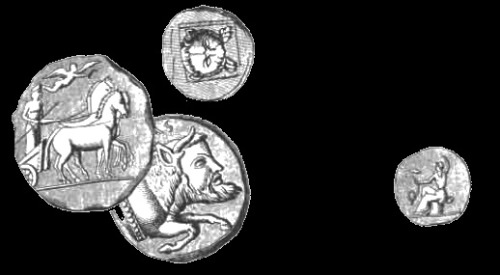Barter is money, but it's not. It's things you have but don't need that you could trade.
In the Fallout video games trade works very similarly, except objects are given a value in bottle caps, the "money" of the setting, and the relative value of objects adjusts based on your character's Charisma or skill in Bartering. But let's say you ignored all of that fiddley nonsense of adjusting cost and introduced bottle caps into Apocalypse World. Would very much change? Characters would likely track their bottle caps, but then you might start feeling the need for tracking the size and weight of all of these caps. Much like AD&D forced you to track the weight of coins.
Trying to equate barter to a system like AD&D (or any of the OSR games where money equates to experience points) where there are different denominations of precious metals makes me really wonder what the value of a gold coin should be. I'm always looking for a simpler system, but barter is almost too simple, it leaves too many questions for players and leads to plenty of disagreements about what barter actually is when you're confronted with other people's ideas of how trade should work in the absence of money.
1-barter will cover a month’s living expenses, if your tastes aren’t too grand.
What are expenses then? Rent and food? Let's assume yes and say that a cheap real-world equivalent would be $200 a month for rent and $40 for food, so 1-barter might equate to $250 in cash. This means that spending 1-barter leaves you living in squalor and eating the apocalypse world equivalent of ramen noodles and metallic tasting water. Pay more and you can likely live in your own place (2-barter a month) and eat steak (4-barter a month). But who do you pay rent to? Where do you get the steak from? Good questions, best answered within the game world.
Let's switch up the dynamics a bit and apply the idea of barter to a fantasy setting. Let's start here: 1 gold coin will cover a month's living expenses, if your tastes aren't too grand.

Living in flophouses and eating gruel, stale bread, and sour ale. Pay more for a small private room in an out of the way inn (2-gold a month) and to eat mutton, fresh fruit, and dark lager (4-gold a month). Now, with this standard, how much do these things cost per day? Assuming roughly 30 days in a month, and dividing gold and silver into the traditional 1-to-10 ratio, the room would cost about a silver per day and the food would cost a little bit more (a silver and three coppers) every day. Pretty simple. A player could handwave that they're living poorly at 1 gold per month, or living at a slightly better but still below average level at 3 gold per month. Or if they really want to they could get into the minutia of what they're actually spending their money on and the GM would have a standard for figuring out the cost of goods.
This standard could also be useful for determining what taxes are. Assume the population is paying about 3 or 4 silver a month per person, unless the local lord has raised taxes higher. A garrison with 48 people (citizens and soldiers) probably brings in about 19 gold per month but a village of 300 brings in about 120 gold per month, on average. If the standard of living is poorly then this is a huge cost for either population, but if they live in better conditions then the local lord probably has leeway to push taxes up. What is a village worth? When an invading army is threatening to burn the fields and steal the cattle, it could represent a loss of 700 to 2100 gold to account for recovery. How much gold is the lord willing to spend to get rid of the invaders? If he can give them 1000 gold to leave for a year, then why would he waste 4000 gold to mobilize an army?
1 gold coin (or 1-barter) will allow you to get by and survive in squalor for one month.
5 gold coins (or 5-barter) will allow you to live comfortably for one month.

No comments:
Post a Comment